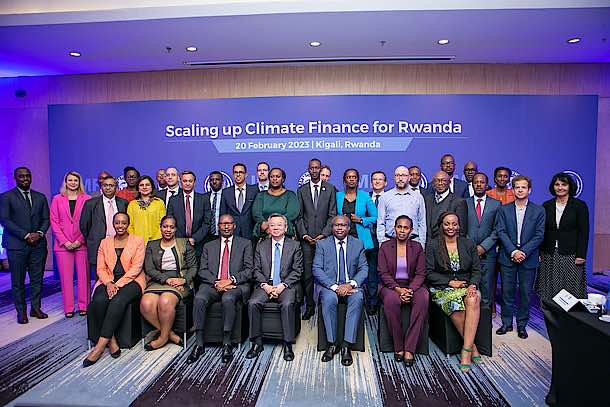
The Deputy Managing Director(MD) of the International Monetary Fund (IMF), Bo Li, is in Rwanda for a one day working visit to discuss scaling up climate finance for Rwanda in the context of Rwanda’s Resilience Sustainability Fund.
The high-level visit follows Rwanda’s historic achievement of becoming the first African country to access financing under the IMF’s Resilience and Sustainability Trust (RST) and the recent visit by the Managing Director of the IMF, Kristalina Georgieva, to Rwanda between 24th and 26th January 2023.
The Deputy Managing Director’s visit aims to showcase the joint commitment of international financial institutions (IFIs) to mobilize public and private climate resources, understand how the RSF can be leveraged to attract private climate finance in Rwanda through Rwanda’s Green Investment Facility, accelerate priority green public sector investments, and reduce the country’s external indebtedness to free up fiscal space for much-needed green investments. During the event, presentations by IFIs (including European Investment Bank and the World Bank’s International Financial Corporation) will be followed by technical discussions with stakeholders on innovative financial solutions to address impediments to access to private climate finance.
The discussions will focus on the best practices how the IMF can support its members, Rwanda, and other African countries, in building long-term resilience for an inclusive future. Rwanda, as the first developing country to access funding through the RST, will be showcased as a role model for championing global green economy.
IMF Deputy Managing Director Bo Li said: “Rwanda’s RSF approval, the first for a low-income country, is a testament to the country’s good climate policies and track record to address climate change.”
The Minister of Finance and Economic Planning Dr. Uzziel Ndagijimana said; “We look forward to access the Resilience Sustainability Fund and to work with the IMF Management to scale up private finance leveraging of the Resilience Sustainability Trust, in order to mobilize significant private climate finance investments in Rwanda, especially through Rwanda’s Green Investment Facility- Ireme Invest.”
The IMF’s Resilience and Sustainability Trust (RST) is a new program that actively supports member countries to build long-term resilience in their economies, with a focus on pandemic preparedness and response to climate change. The agreement will see Rwanda access up to $319 million in highly concessional financing to advance efforts in building resilience against climate change. The facility will contribute to the Government of Rwanda’s efforts to advance climate policy reforms to help reach its NDC goal of 38% emissions reduction by 2030, and being carbon neutral by 2050 in line with Vision 2050.
Rwanda’s efforts in climate change mitigation are outlined in its 2020 revised Nationally Determined Contribution (NDC), designed to mutually reinforce adaptation and mitigation objectives, and to support Rwanda’s low carbon and resilient national development ambitions.
The visit by the IMF’s Deputy Managing Director, Bo Li, presents a unique opportunity for Rwanda to continue advancing its climate agenda while enhancing its macroeconomic resilience, and for the international community to practically contribute to this effort. Rwanda remains committed to achieving a low-carbon economy, and with the support of the IMF and other IFIs, the country will achieve its ambitious climate goals.
Rwanda’s relationship with the IMF began in 1966 when the country received the first IMF and Rwanda stand-by arrangement. Since 2010, the country has embarked on both financing and non-financing programs, including the Policy Support Instrument (PSI), the Standby Credit Facility (SCF) and recently the Policy Coordination Instrument (PCI) and the Resilience and Sustainability Facility (RSF). The country has been doubling its efforts on climate change mitigation and adaptation, as outlined in Rwanda’s 2020 revised Nationally Determined Contribution (NDC)
